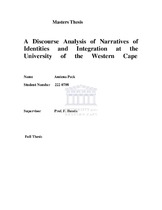| dc.description.abstract | In the thesis, I endeavour to create a platform on which to construct an understanding of 'integration' in a multilingual and multicultural setting, post-apartheid. I have selected UWC as the research site as it is an institution of higher education and an inherently South African one which houses a large number of diverse ethnicities, cultures and languages. I appeal to the poststructuralist approach as it is one that explores the possible sociopolitical, economic and historical influences on which I argue and which forms the backdrop to understanding integration amongst the various groups. I am especially drawn to the topic of integration as there is to date no well-defined definition of what that means in the 'new' South Africa. Different identities are explored in relation to how students identify themselves within their social networks, across various cultures and through language choices. In particular, I look at the three dominant 'South African' groups, namely: Indians, Blacks and Coloureds and also two international student groups, the Batswanas and Chinese. use a qualitative approach and undertake focus groups and one-to-one interviews as well as participant observations and analyzing documentation. Data analysis is achieved through Discourse Analysis of transcribed interviews. One of the conclusions is that integration will not occur overnight. However, the broadening and exercising of linguistic options could be seen as a step in right direction to integration across the various ethnic groups. The study ends with recommendations and gives an overall view of integration at UWC. One of the recommendations is that UWC needs to give students more opportunities to practice their multilinguality and thereby broaden their linguistic repertoire which could in turn facilitate integration. | en_US |

